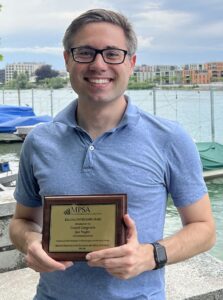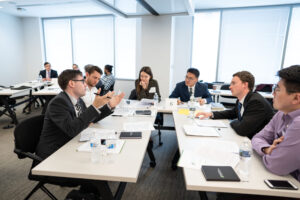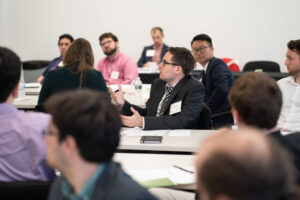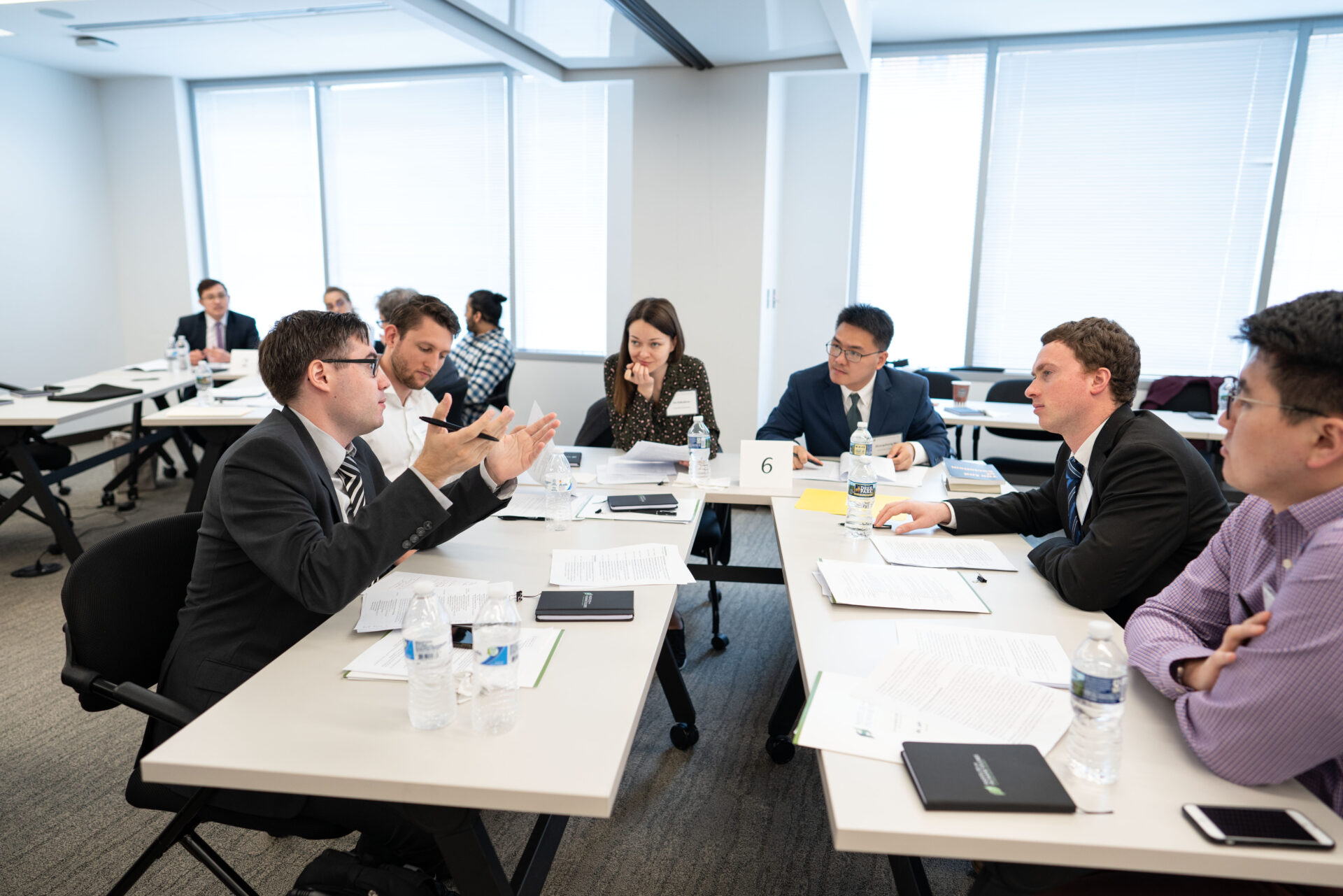
Jan Vogler
While visiting George Mason University in Arlington, Virginia, for a Mercatus Center graduate fellowship, Jan Vogler heard that another organization called the Institute for Humane Studies was offering graduate student research workshops. “And I thought, ‘Why not go to one of the research workshops that were advertised?’” Vogler recalls. “Because I am really, deeply convinced that the main way to improve your research is to expose it to criticism.”
During his doctoral studies in political science at Duke University, Vogler began attending IHS events, including those graduate research workshops. “The IHS is really great at bringing people together to critically think about each other’s work,” Vogler reflects. “And the good thing is, at the same time, when you go to the IHS to present your research there, the stakes are not as high as they are at professional conferences. So I think, especially for early stage PhD students, it is a good idea to come to the IHS and present their work there.”
“The IHS is really great at bringing people together to critically think about each other’s research.”
– Jan Vogler
Critical thinking includes hearing from scholars who come from different backgrounds and worldviews. The open exchange of ideas, Vogler says, is one of the strengths of IHS events. “It seems to me — from my experience with the IHS — that what the IHS emphasizes is just this openness to different ideas and the exchange of ideas,” Vogler says. “And even if you don’t agree with someone 100% of the time, you can still value their position.”
While Vogler does not define himself as a classical liberal, he values the ideas and impact of the tradition on his field. “Sometimes you will not be able to completely convince someone,” Vogler says. “But just the ability to listen to another person who has a different perspective is very important, I think.”
He appreciated not only the professional support and valuable feedback from IHS programs like the graduate research workshops, but also the interesting conversations with other scholars outside of his usual network of advisors and peers. “I actually met a lot of people who are in political science through IHS,” Vogler states, “And many of them are my friends today.”

“Sometimes you will not be able to completely convince someone, but just the ability to listen to someone who has a different perspective is very important, I think.”
– Jan Vogler
Vogler also took advantage of IHS funding opportunities while pursuing his PhD. He applied to the Hayek Fund multiple times for various projects, and IHS was able to offset some of his graduate research expenses. “Applying for them was relatively uncomplicated, which was very much appreciated,” Vogler says.
One of the IHS awards supported the development of a website that he and his co-author, Paweł Charasz, needed to successfully execute an experiment and continue their research on Polish government capacity at the local level. Vogler affirms that “even small amounts can make a difference for young researchers.”
Vogler and Charasz ran a randomized survey to measure changes in local Polish government capacity due to European Union funding. After the fall of the Soviet Union, Poland had joined the European Union and received funding to encourage local government growth. Vogler wondered if they could discern improvements in local government efficiency through responses to survey inquiries.
To test this, Vogler and Charasz developed different surveys to send to statistically indistinguishable local government administrations. By comparing government responses to different types of inquiries — inquiries that presented different primary purposes — they would observe the response rate to determine if the governments, by weighing the priority level of different inquiries and responding accordingly, worked efficiently .
“I not only felt very productive, but also very supported.”
– Jan Vogler
 In 2019, Vogler presented this analysis in an early draft of their paper at the IHS Summer Graduate Research Fellowship program, where he received critical feedback from faculty and an interdisciplinary group of graduate students. “I felt it made the last summer of my PhD program very productive,” Vogler says. “I not only felt very productive, but also very supported.”
In 2019, Vogler presented this analysis in an early draft of their paper at the IHS Summer Graduate Research Fellowship program, where he received critical feedback from faculty and an interdisciplinary group of graduate students. “I felt it made the last summer of my PhD program very productive,” Vogler says. “I not only felt very productive, but also very supported.”
Vogler recalls that he received helpful feedback, which he and Charasz then incorporated to improve their paper. “IHS was very helpful in different ways,” Vogler says. “One was that it enabled us to do this survey in the way that we wanted to do it, and the other one was that we also got very critical, good feedback.”
Following months of review and revision, Vogler and Charasz eventually published the final paper “Does EU funding improve local state capacity? Evidence from Polish municipalities” in the journal European Union Politics (EUP). Their paper not only was accepted, but also won the SAGE Award for the best article that year in EUP.
“IHS was very helpful in different ways — one was that it enabled us to do this survey in the way that we wanted to do it, and the other one was that we also got very critical, good feedback.”
– Jan Vogler
Vogler has gone on to publish more research, including a paper he co-authored with Daniel Gingerich on “Pandemics and Political Development: The Electoral Legacy of the Black Death in Germany.” This paper won the 2022 Kellogg/Notre Dame Award for the best paper in comparative politics from the Midwest Political Science Association (MPSA).
Career success requires perseverance, organization, and hard work, Vogler admits. He notes that the job market is especially demanding, and he remembers approaching interviews at various institutions with determination before landing a post-doctoral research associate position at the University of Virginia. Vogler pushed through cycles of applications, interviews, and disappointment before securing a post-doctoral, and then faculty, position.
The hard work is paying off, and today Vogler is a juniorprofessor — the German equivalent of an assistant professor — in quantitative social science at the University of Konstanz in Germany. His research and teaching focuses on quantitative methods and political economy, and he instructs students in research methods, as well as ideas. Vogler is thankful that the University of Konstanz allows him to put a lot of emphasis on his research through a low teaching load and small class sizes.
“It is a true privilege to live in this city, and it is one of Germany’s leading universities, especially in political science,” Vogler says. “And so being a part of a very strong department that produces internationally visible research is great.”
